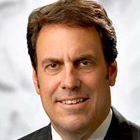Mark Reuss

MBA '90
What do you do professionally?
I manage everything from R&D, purchasing and product development for GM vehicles. In doing so, I spend my time in a lot of different places. In any given week, I might be at our headquarters in Detroit; at the GM Tech Center in Warren, MI, where new vehicles are designed; at our Global Propulsion Systems center in Pontiac, MI; or our proving grounds in Milford, MI, where we drive all of our prototype cars before they go into production. My days are full, but always interesting.
What is the most enjoyable part of your job?
I really enjoy going to the plants and seeing our products going into production. I am amazed at how our talented staff with deeply mechanical minds can solve big problems and create such phenomenal designs.
What is the biggest challenge you face?
Because the length of time from conception to a car rolling off our assembly lines is so long, we constantly have to think about what the business needs to be 5-10 years from now. We're getting ready for a huge inflection point in automobiles with the advent of autonomous cars, ride sharing, and massive changes in propulsion through alternative fuel sources.
What sorts of interesting places has your position taken you? Do you have a favorite?
I travel regularly to Germany, China, our technical center in Canada, and to our R&D operation in Israel. I particularly enjoy Germany, as there is a deep car culture there and a big business challenge in competing with the German auto industry.
What is the best professional advice you've received?
My dad, who had a long career at GM as well, told me, "Find out what you want to do, and do what makes you happy," and "Worry about the job you're doing today." We spend much of our lives at work, so you have to choose something you're passionate about.
Aside from your current role, what is your dream job?
That's a tough question. I would say race car driver, but that's a really tough lifestyle. It would be fun to go into schools and teach business. I've worked through a lot of ups and downs during my career, and I think I have a unique experience to share from a practitioner's perspective. I've worked with the Ross School of Business at the University of Michigan where they've done case studies around GM business. It's fun to go and watch students play my role in a case and then to talk with them afterward about how we handled the issue in reality.
What do you like to do outside of work?
I like to work on old cars—I've probably bought, worked on and sold 20 cars over the years. I currently have several Corvettes: a '54, a '62 which was the first model with mechanical fuel injection, and a '63 which was the split-window coupe. I spent eight months working in Australia and ended up buying and restoring a '59 Holden. My family and I made such great memories with that car that I brought it home with me. I have three kids, so I also spend a lot of time with them at their sporting events and vacationing.
What is the most important thing you learned during your time at Fuqua?
I didn't know anyone coming to Fuqua. I was trained as a mechanical engineer, which was a different background from most of my classmates. I was used to working on projects alone, and Fuqua taught me a great deal about working in teams. It was highly rewarding to come together with people you didn't know and to figure out how to leverage each person's strengths to solve a problem together. One person might have a great deal of knowledge about finance or marketing, and when there were questions about technical issues, they could leverage me as well.
Who was your favorite professor?
I had Jane (Butt) Reimers for accounting, and she was a phenomenal teacher. We also had an economics professor who had come from Harvard, and I learned so much from him. We were at Fuqua when the wall fell in Germany, and his perspective on that was outstanding. I also learned a great deal from Helmy Baligh, who taught queuing theory.
What is your favorite Fuqua memory?
I played on the graduate club soccer team as the goalie. It was amazing to play with people from around the world. We ended up one goal shy of the championship. My classmates and I also spent one spring break sailing from Ft. Lauderdale to the Bahamas. We took out 6 or 7 24-foot Morgans. I had never really sailed before, but ended up captaining one of the boats. It was a fantastic trip.
Why do you support the Fuqua Annual Fund?
Because this school has only gotten better. When I attended, it was a very young school and it was kind of a bet to go here among other choices. I've watched Fuqua over the years, and the school is continually ahead of the curve in things like leadership education, executive education, and innovation. They provide a business education in ways that no one else can.
What does Team Fuqua mean to you?
When I came to Fuqua, I was impressed that the faculty operated as one unit. They were focused and had a tight connection between disciplines to deliver a well thought out curriculum. Dean Keller took that homogenous approach, and it provided an exceptional experience.